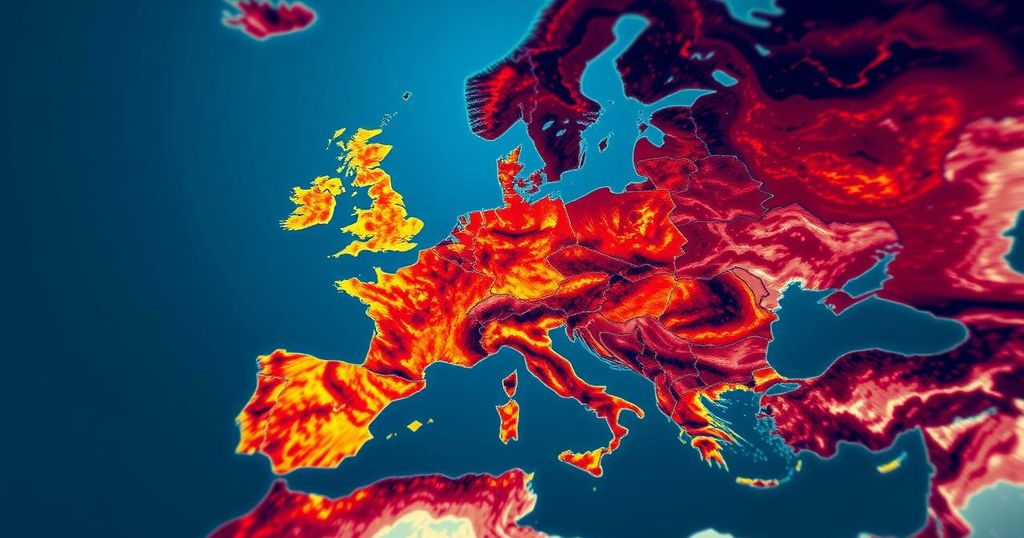According to Europe’s Copernicus Climate Change Service, 2024 is expected to be the hottest year on record, likely exceeding the 1.5 degrees Celsius increase from pre-industrial levels. These findings were shared before the COP29 meeting, where countries will discuss the need for increased funding to combat climate change. Climate scientists attribute this rise primarily to the release of carbon emissions from fossil fuels, emphasizing the urgency for stronger action to mitigate these impacts.
The Copernicus Climate Change Service, Europe’s climate agency, has issued a stark warning that 2024 is anticipated to become the hottest year recorded, surpassing the previous high set in 2023. This projection includes concerns that, for the first time, global temperatures will exceed 1.5 degrees Celsius above pre-industrial levels, a threshold associated with significant climate impacts. These findings were disclosed ahead of the United Nations COP29 climate conference in Azerbaijan, where global leaders will contemplate increasing investments to combat climate change effects. Data collected from January to October indicates a marked rise in global temperatures, making it almost certain that 2024 will set a new temperature record. The Copernicus agency has maintained records beginning from 1940 and aligns them with historical data from as far back as 1850. Carlo Buontempo, Director of Copernicus, attributed the record-setting heat primarily to climate change. He stated, “The climate is warming, generally. It’s warming in all continents, in all ocean basins. So we are bound to see those records being broken.” Buontempo emphasized that this anomalous warming would not be plausible without the ongoing release of carbon emissions, primarily resultant from fossil fuel combustion. Copernicus relies on extensive global data collection from various sources, including satellites and weather stations, to substantiate its findings. Climate scientist Sonia Seneviratne from ETH Zurich expressed no surprise regarding the forecast but pressed for concerted action at COP29 to curb carbon emissions. She remarked, “The limits that were set in the Paris agreement are starting to crumble given the too-slow pace of climate action across the world.” Most countries have pledged to restrict global temperature rise to within 1.5 degrees Celsius, as enshrined in the 2015 Paris Agreement. However, predictions signify that this critical threshold may be surpassed by approximately 2030, a troubling indication of imminent climatic challenges. Buontempo encapsulated the urgency of the situation by stating, “It’s basically around the corner now.” Chillingly, scientists warn that with each degree of temperature rise, the likelihood of extreme weather events escalates, a reality evidenced by recent devastating flooding in Spain and wildfires in Peru, among others. This ominous trend highlights the dire need for immediate global initiatives to combat climate change and safeguard vulnerable regions from its relentless impacts.
The discussion surrounding climate change has gained greater urgency in recent years, attributed to the increasing frequency of extreme weather events and significant shifts in global temperatures. The Copernicus Climate Change Service serves as the European Union’s flagship climate change observation program, synthesizing data about climate patterns and trends. The importance of adhering to international agreements, such as the Paris Agreement, becomes paramount as nations navigate the complexities of limiting global temperature increases to avert catastrophic environmental outcomes. These themes are set against a backdrop of ongoing international dialogues, such as the COP conferences, which seek to unify global efforts against climate change.
In conclusion, the predictions released by Copernicus underscore the urgent reality of climate change, with 2024 poised to break temperature records and surpass critical thresholds established by international climate agreements. The continuous rise in carbon emissions necessitates decisive action from global leaders at each COP meeting to implement strategies that could effectively stem the alarming trend of climate warming. Heightened awareness of the effects of climate change is crucial to mobilizing comprehensive international cooperation aimed at future sustainability.
Original Source: learningenglish.voanews.com






